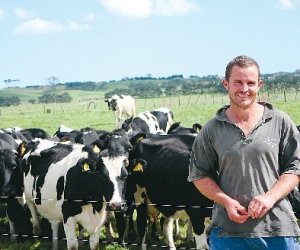Rope is a lower order sharemilker on a 360ha, 980 cow family farm 10km south of Dargaville.
For a few years Rope has focused on staff management and says he has been rewarded with a smoother running, more profitable farm as a result.
He has five workers, all of whom are necessary on a farm this size, he says.
“It is a lot but we produce a lot of milk,” says Rope. “We could get by with three plus myself but it would be hard yakka.”
This number allows some leeway in case of emergency, especially important given the difficulty of finding good staff. “Staffing is such a battle.”
Attracting staff has been such a big issue that while he is more than happy with current staff he offered a $5000 scholarship to entice an ambitious, good quality worker to ‘future proof’ his workforce.
Rope advertised in the local paper, inviting people keen to enter farming to contact him. He offered $5000 towards formal agricultural training at a university, AgITO course or rural polytechnic.
In return they were required to work for him during their summer holidays and give him the first option on a contract for at least a year at the end of their studies.
Only one person applied for the scholarship this year but Rope says he is happy with the result and is confident his pay-off will be the ability to attract a string of motivated, quality employees.
“I will get someone with a bit more drive who wants to get involved in the industry,” says Rope. “Someone who’s had a good background at uni will accelerate through the industry faster than someone who’s just plugging along.”
Rope plans to offer the scholarship every one or two years and is surprised more people don’t use the education scholarship technique as a way to attract staff.
“I know a few farmers use it for existing staff members but I haven’t heard of it happening this way before,” says Rope. “Banks do it to attract top-quality recruits so you’d think big farms would do it.”
In doing this, Rope has emulated other businesses, as well as including plans for defined communal office facilities and defined chains of command.
“On larger farms you need to develop some structured lines of command and communication otherwise things will disintegrate quickly,” says Rope. “I have tried to maintain a work ratio of 70% farmwork and 30% management work to do this.”
Another leaf Rope has taken out of corporate manuals is attending industry events to see what works and what doesn’t. He is on the management board of the Northland Agricultural Research Farm and makes sure he attends at least 4-5 industry field days a year.
“It’s a good way to get figures; you’re benchmarking for the main business you have at home.”
However he says not everybody accesses the information.
“All the information is there to be used. People just sometimes prefer to box on... the same way they always have.”
















